#the society that destroys its own youth
Explore tagged Tumblr posts
Text
now I just rolled into this establishment but it seems to me that jujutsu kaisen is in fact entirely about cannibalism. eating fingers, eating curses, eating your twin inside of the womb, eating your twin outside of the womb. archaic power structures that needlessly burn out their own young. ancient spirits assimilating little girls. prison realms full of bones that slorp you up. the envelopment of a domain, like being in something’s stomach sloshing around inside it. this is not a story about love! it’s a story about devouring and love just happens to look similar.
#jujutsu kaisen#jjk#the themes are all *eating you eating you eating you*#*crying and having moral compunctions but still eating you*#sometimes the cannibalism is via other gothic horror tropes#the family turning in on itself ourobouros-like#the society that destroys its own youth#but even those are all consumptive
29 notes
·
View notes
Text
Laios, Monsters, & Toshiro: On Racialized Desire and Identification with the Other
Arguably, the most significant part of Laios' character is the societal ostracization he faces because of his non-normative interests and behavior. For the majority of his life, Laios struggles socially, and other humans mistreat him. When he rescues Marcille from the Nightmares, his nightmare dredges up his inability to fit into school and the army. During his early dungeoneering days, he's lied to and exploited by his fellow party members.

One of his earliest and most formative negative experiences with people is his village's abuse of Falin as a magic user. He shares that after the villagers discovered that she can use magic, "adults who were just kind yesterday, all began to bully [her]." Instead of protecting Falin, his parent tell her to leave the village. The prejudice Falin faces and his parents' response to it upsets Laios to the point that he leaves home.

While Laios cares about his friends, the Demon points out that Laios understandably does not care for people in general. Laios doesn't disagree with the Demon's assessment and suspects that the Demon "can sense all [his] thoughts." The Demon goes on to say that Laios actually "despise[s] all humans." Laios denies this assessment, but given the Demon's uncanny ability to sniff out people's desires and Laios' ashamed expression, at least part of Laios likely agrees with the Demon. It's not a stretch to assume that he's held onto some hurt and resentment towards humans due to their mistreatment of him and Falin in their youth.

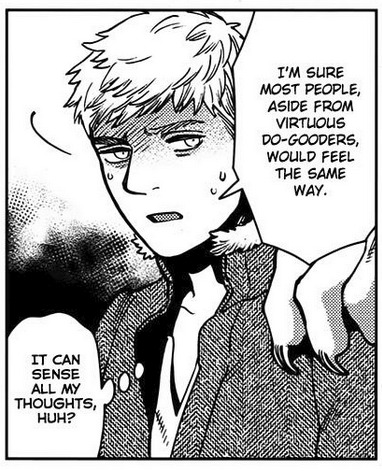
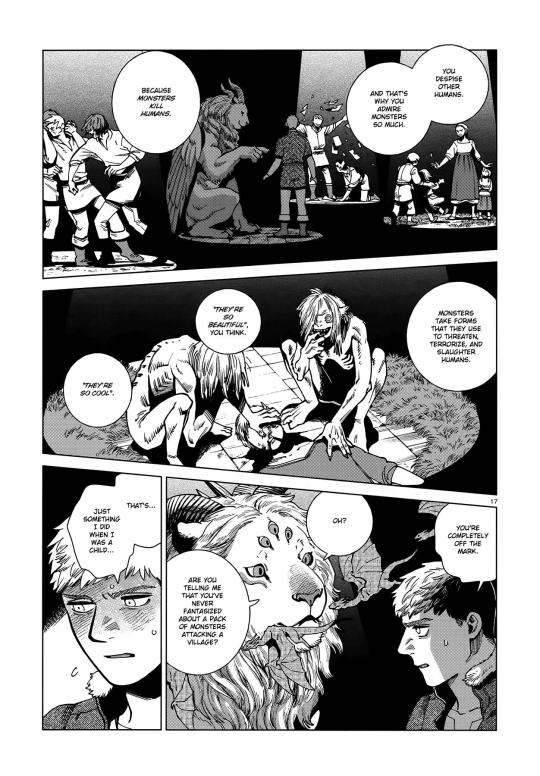
In response to how human society has othered him, Laios distances himself from humans and invests his time and energy into monsters and demi-humans instead. In the DunMeshi world, monsters and demi-humans are the ultimate societal Other. People fear them, exploit them, and even hunt and kill them. As someone who's similarly been mistreated by human society, Laios resonates deeply with monsters.
His desire to become a monster and/or beastman reflects his desire to reclaim agency over how society has ostracized him. If he chooses to become a monster, he gets to place value on what society has deemed despicable. He gets to choose why society hates him and be different on his own terms.
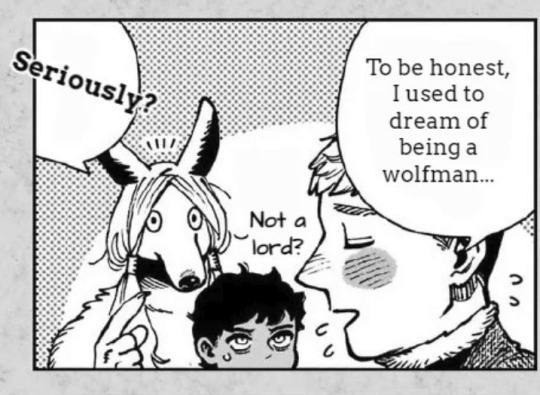
Both textually and thematically, Laios' identification with the Other bleeds into the erotic. More blatantly, he says that he'd have sex with orc women, and his succubus is a monstrous version of Marcille.


The entire story is also steeped in the theme of consumption as carnality. Laios and his party spend the entire manga eating monsters — a taboo physical act which they reap pleasure from; the underlying eroticism isn't difficult to see.
The story also presents consumption as a form of extreme identification. Eating a monster makes the monster part of you through digestion. The line between consuming the monster and becoming the monster — between erotic desire for the monster, demonstrated by eating their flesh, and identifying with the monster — is very blurred. Note that digesting a monster is an act of absorption; it destroys the original creature. Senshi states that consuming a monster erases "its individual identity," and major manga spoilers, but Laios defeats and pacifies the Demon by consuming its desire to eat. We'll come back to this concept later.
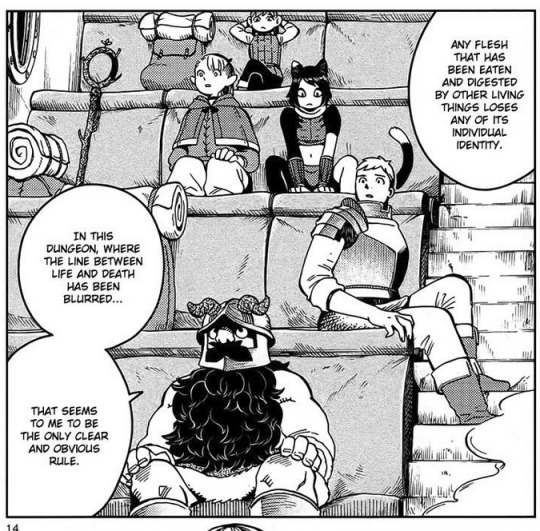
As previously mentioned, Laios is disinterested in most humans. The notable exception to this rule is Toshiro and by extension, the Eastern Archipelago. Laios doesn't seem to know much about the Archipelago before speaking to Toshiro, so he isn't drawn to Toshiro because he's an Easterner. Instead, he's drawn to his "odd appearance."
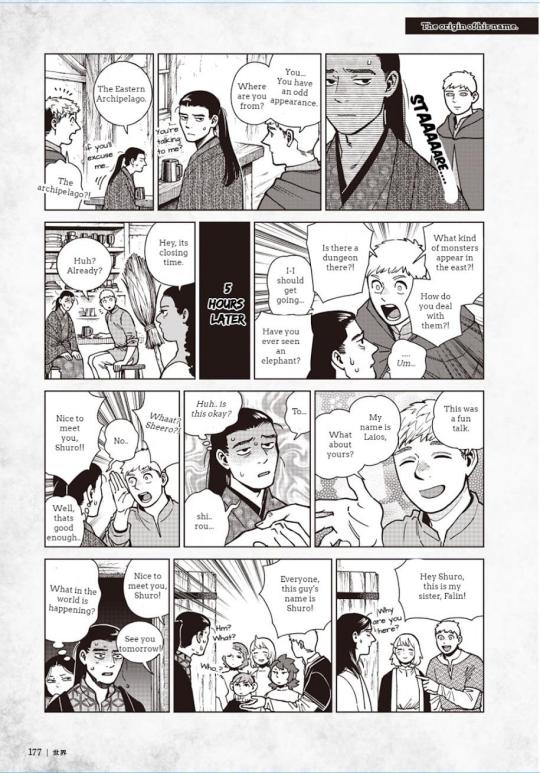
Just like Laios views monsters and demi-humans as a visible Other, Laios views Toshiro as another visible Other. On the Island, Toshiro stands out as a foreigner at first glance. While Laios as a white tallman doesn't appear visibly strange to other people, he's drawn again and again to people and creatures who are immediately visibly "odd." He sees them as understanding what it's like to be different and be mistreated for it, and since he relates to that experience, he wants to learn about them and be closer to them.
Essentially, Laios behaves towards Toshiro and his culture the same way he behaves towards monsters; he wants to know everything about Toshiro's foreign culture — the thing which makes him different. Unintentionally, Laios unintentionally reduces Toshiro to being Japanese; if he wasn't Japanese, Laios would never have approached him.
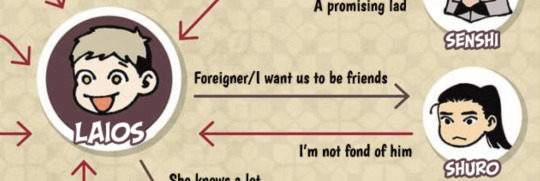
While Laios doesn't have bad intentions, as Toshiro himself acknowledges during their fight, his behavior towards Toshiro still has negative consequences. Laios' harmless interest in monsters translates to fetishization in the context of Japanese culture. He enacts multiple microaggressions against Toshiro and crossing his boundaries.
Laios goes beyond merely learning about Japanese culture. He takes parts of it for himself when he names his sword a Japanese name. Akin to his consumption of monsters, Laios attempts to participate in Toshiro's culture while failing to respect Toshiro himself. Just as eating monsters destroys them, Laios consuming Toshiro's culture while enacting racism against him causes real harm.
Many people have already written about Laios' microaggressions towards Toshiro, but a couple include Laios telling Toshiro that he looks "odd" and asking where he's from, mispronouncing his name as "Shuro," and assuming his favorite food is rice. Laios' treatment and fetishization of Toshiro is racist and harmful. However, I'd like to dive beyond the surface of Laios' micro-aggressive remarks and examine how his obsession with Toshiro becomes a racialized mode of desire, paralleling real world phenomena.
Though no concrete canonical evidence of Laios' feelings towards Toshiro being romantic and/or sexual exists, his interactions with Toshiro have erotic undertones. Their fight dialogue, in particular, revolves around eating, an act the story consistently shows as carnal. During this fight, Laios places his thumb in Toshiro's mouth and asks him, "What's the point of even having a mouth?" Laios' penetration of Toshiro's body via his mouth and his question's potential as an innuendo lend themselves to an erotic reading of the scene's more obvious conflict. Considering the overlap between consumption and carnality throughout the story, it's not a large jump to read eroticism into Laios demanding Toshiro meet his body's physical needs.

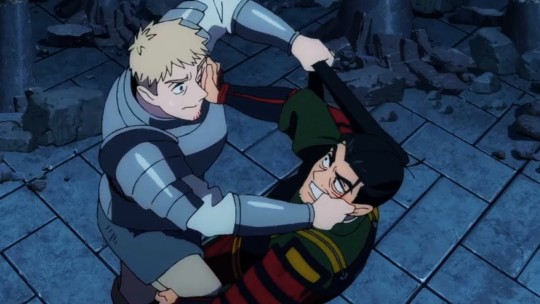
Furthermore, Laios is more enthusiastic about Toshiro than any other human in the series. While he cares deeply about his sister and his friends, Laios repeatedly expresses how much he admires Toshiro. He retains and brings up things like Toshiro's (perceived) favorite food. He wants to go to the East in Falin's place after she rejects Toshiro's marriage proposal, and in the "What-If" extra material, he's adamant about setting up a scenario where Toshiro travels with him through the Dungeon.

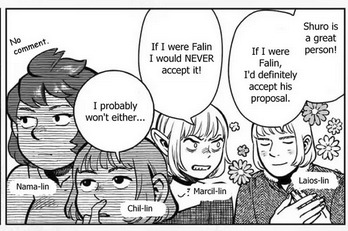

Undoubtedly, Laios is drawn to Toshiro. Since he sees non-white-ness and monstrosity as equivalent markers of societal othering, Toshiro's identity as a foreigner is what cultivates and maintains Laios' interest in him. Even if Laios learns to care for Toshiro as a person, his desire for Toshiro, platonically or otherwise, is still filtered heavily through race within the narrative.
Laios' relationship with his masculinity is also fraught. He broke off his engagement with a girl from his village and doesn't express normative interest in female tallmen. Seeing how the nightmare versions of his parents ask him when he's going to give them grandchildren, Laios experiences societal pressure to conform to a normative performance of masculinity through being attracted to and marrying a tallman woman and creating a family with her.
Laios frequently talks about how cool and admirable Toshiro is when he performs masculinity through combat, etc. He might find Toshiro's Asian masculinity more appealing and more accessible to him than the masculinity that's been forced onto him, precisely because Toshiro's Asian masculinity appears non-normative in a Western lens. But co-opting the masculinities of men of color as a white man would only further feed into the white consumption of cultures of color.
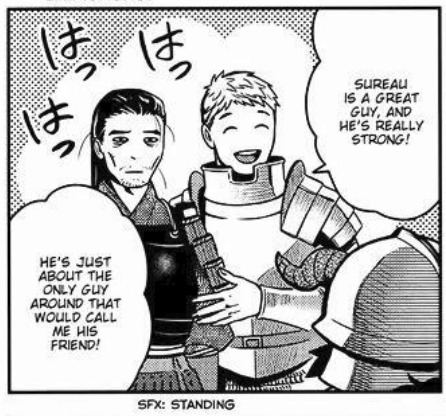
Overall, Laios' entitlement to and consumption of Toshiro's culture mirrors the real-life way white people co-opt and fetishize non-white cultures. Laios' fetishistic treatment of Japanese culture, because of his attraction (platonic or otherwise) to Toshiro, parallels white people's treatment of Asian people in the Western diaspora. I can only speak on the Asian American experience, but Laios immediately being drawn to Toshiro's "odd appearance," obsessing over his culture, and primarily treating Toshiro as a conduit for his said culture feels eerily close to how some white anime and/or K-pop fans act towards Japanese and Korean people.
Similarly to Laios, real queer, neurodivergent, and/or otherwise non-normative white people are marginalized by white Western society. They relate to how society others non-white cultures and/or people of color and latch onto them. While forming human connections based on curiosity and shared experiences is wonderful, white people are often unaware of the racial dynamics at play when they engage with non-white cultures and people of color and unintentionally, end up consuming and fetishizing non-white cultures in detrimental ways.
None of this negates the reality that Laios and Toshiro canonically care for each other. For instance, Toshiro's willingness to hug Laios reveals his genuine familiarity with and affection for him. The racial dynamics of their friendship complicate their relationship in fascinating ways and open up a potential path for Laios' growth. With time and effort, Laios could absolutely unlearn his racism and become a much better friend to Toshiro.
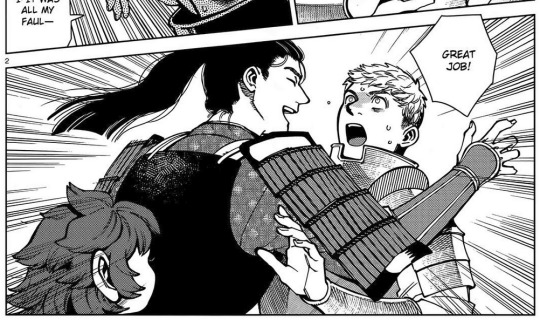
In conclusion, Laios' behavior towards Toshiro is a study in a marginalized white person's identification with and racialized desire for a non-white Other and how even a well-intentioned attempt at connection can replicate harmful racist dynamics. Toshiro's experience with Laios closely parallels real Asian people's struggles with racism and fetishization in our world today.
#laios touden#toshiro nakamoto#shuro#dungeon meshi#dunmeshi meta#dunmeshi analysis#i didn't want this to be superrr long but laios' treatment of the orcs is similar to his treatment of toshiro#he takes their cultural practices out of context and appropriates them (i.e. him wearing spoils of war when he declares himself king)#frankly him wanting to be an orc/wanting to sleep w orc women/appropriating their culture#and blurring the lines between identification/desire/consumption is even more clear than w toshiro#ryoko kui has a lot of interesting racial commentary in her work#but also she kinda flops on her depictions of black and brown ppl#anyw all very interesting to examine#i love u themes of consumption and desire and identity and borderline cannibalism#dunmeshi#delicious in dungeon#*mine#*meta
306 notes
·
View notes
Note
Hi, could you write something for Coryo x reader were the reader is close if not equally as evil in the end. How would that relationship work? idk just a thought I had use it if you wish
crack in the mirror
coriolanus snow x fem!reader
word count: 1.8k
warning: i think none
summary: Many cling to the belief of their own goodness, until they meet someone who's just like them.
a/n: hii, thank you so much for your request!! i hope you'll enjoy what i've written for you!<33
pages that may interest you: masterlist ♡ taglist ♡ who i write for
taglist: @watercolorskyy
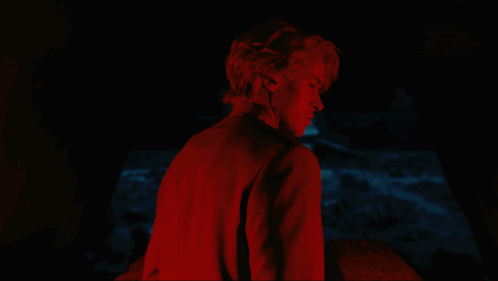
gif is not mine, credit to the owner
How did it all begin?
With the 10th Hunger Games, where your academic excellence earned you the role of mentor to one of the tributes.
It was a time of innocence and youthful ambition, back when your paths met within the shadowy corridors of the Capitol's Academy. You and Coriolanus were close friends, unstained by the cruelty that life had in store for you and you pretty often looked back on those days, memories of laughter, shared dreams, and an unwavering friendship etched in your mind.
The two of you were bound by a shared ambition, shining among the brightest stars, each destined for greatness in the eyes of those who believed in you. The world was your playground, and you were determined to conquer it. Little did you know how that fateful year, with its trials and tribulations, would set the course of your life on a much darker path.
As the mentor to Treech from District 7, you hadn't yet embraced the darkness that would soon consume you. Back then, you were as eager as your colleagues, hoping to prove your worth, do your best, and guide your tribute to victory. It was pretty cruel twist of fate that Lucy Gray Baird, with her haunting charm and cunning nature, would change the course of everything.
In the heart of those unforgettable 10th Hunger Games, within the unforgiving arena, your dreams and aspirations slowly began to twist and corrode. Ambition transformed into ruthless manipulation, friendship into subtle deception, and innocence into a devouring thirst for power. The venomous snake mutt that took Treech's life before your very eyes became a symbol of the ruthless transformation that was gradually overtaking you.
That year marked the beginning of your involvement in the Games and the emergence of a darkness that would one day reflect the very core of President Snow himself. The metropolis watched, captivated by the spectacle of the tributes battling for their lives, while behind the scenes, a bitter change took root.
As you stood alongside the other students in the viewing room, preoccupied with the tributes, a chill ran down your spine. You didn't yet grasped the feeling, but something fundamental had shifted within you. You couldn't shake the realization that in the Capitol, victory meant survival, and survival allowed for anything. Lucy Gray's actions, no matter how brutal, were merely a reflection of the society to which you belonged.
Coriolanus tried to hold onto the purity of your friendship, to keep the darkness at bay, but you were the values he progressively ignored. Ambition has a way of distorting even the best intentions, and the path you had chosen was covered in shadows and secrecy.
As the Games progressed, the transformation hastened. The bonds you had formed with others became instruments of manipulation, and you enjoyed your newfound ability to bend their will to your desires.
The suffering of each tribute, each extinguished life, stoked the icy flames of ambition within you. You clutched to the logic that to climb up the Capitol's hierarchy, you had to be willing to destroy all who stood in the way. Your heart grew cold, your smile more deceitful, and your soul darkened, much like the future President of Panem that Coriolanus didn't yet realize he would become.
The Games ended with Treech taking the third place, a result you considered an absolute failure. It served as the catalyst for your final descent into the abyss. You had only tasted a little bit of success, and you hungered for more. The purity of your friendship with Coriolanus had been definitely tarnished, and the darkness that enveloped you continued.
The 10th Hunger Games and the Gamemakers marked not just the beginning of a change within you, but also foreshadowed the dark days to come.
You and Coriolanus would be leaders of a world where cruelty and manipulation held authority.

You had come a long way since those innocent days at the Academy, where laughter and shared dreams were the currency of friendship. As the Head Gamemaker, you wielded power over life and death, orchestrating the annual Hunger Games spectacle that captivated the Capitol.
Your importance in the Capitol was undeniable, but the bonds of friendship that once connected you to young Snow had weakened, stretched to their limits, and threatened to break. Since your graduation from the Academy, the warmth of your interactions had been replaced by a chilling formality. The echoes of your former closeness had grown faint, drowned out by the sounds of the ruthless Games you helped design.
Coriolanus, still crawling in his presidency, remained in your life as a hint of your teenage years and shared mentorship past. He was both intrigued and disturbed by the ideas you injected into the Games each year, but he never consciously acknowledged the rot that had taken root within him as well.
As the Head Gamemaker, you reveled in the dark art of power, where tributes became pawns and suffering was blend into the very fabric of the arena. Your ambitions had propelled you to the highest echelons of Capitol society, but the biggest cost had been the destruction of the humanity that once defined you.
Determined, you made your way to the meeting room, eager to introduce Coriolanus to your plan for the 23rd Hunger Games.
He was already there, wearing an expression that mixed curiosity with apprehension. You greeted him with a cool nod, fully aware of how your interactions had grown more formal over the years.
“Coryo,” you began, saying the familiar diminutive you'd used back at the Academy. The warmth of that old friendship may have cooled, but the nickname had grown in you, a habit you couldn't shake when you were alone with him. “I've prepared something truly phenomenal for this year's Games. Something that will cause goosebumps on the skin of every viewer, let alone the tributes in the arena,” you said, locking your gaze with your old friend with a mysterious smirk on your lips.
In response, Coriolanus leaned in with growing curiosity. “Please, continue,” he urged, which only caused a wider smile on your face.
You gestured toward a holographic projection on the wall, revealing a sinister, genetically created creature. Its elongated limbs, razor-sharp claws, and grotesque, misshapen features created a nightmarish creation.
“This,” you declared, “is the Umbra Noctis. It's a creature designed to terrify and torture the tributes in ways they could never have imagined. With its ability to blend into the shadows, it will stalk them relentlessly, striking fear into their hearts.”
Coriolanus observed the creature, a mixture of fascination and consternation in his eyes, narrowing the gap between you. “But how does it differ from the mutts we've used before?”
You leaned in, your voice dropping to a chilling whisper. “It carries a venom that induces hallucinations, distorting reality for its victims. The terror it inflicts will be as much psychological as it is physical.”
As you detailed your plan, the room seemed to grow colder, and the weight of your shared darkness pressed on Coriolanus. You described the various mutants and horrors destined for the arena, all designed to heighten the tributes' fear and despair.
“I want the 23rd Hunger Games to be remembered as the most nightmarish ever,” you declared. “A spectacle that reveals the true depths of human darkness, concealed behind the Capitol's glittering facade.”
As the weight of your words settled in the room, Coriolanus’ initial curiosity gave way to a growing skepticism. He couldn't help but question the depths of darkness you were willing to immerse.
“Isn't this,” Coriolanus began, his voice cautious, “perhaps too much, even for the Hunger Games? We want to entertain, to captivate the audience, not to... terrify to the point of despair.”
You turned to him, your gaze firm, and for a moment, the professional mask slipped, revealing the abyss beneath. “Coryo, don't you see? The Capitol's fascination with the Games is not just about entertainment. It's about the harsh reality that we, as a society, have become as ruthless and depraved as the Games themselves. We are a reflection of the horrors we create.”
Coriolanus eyed you, his features a blend of recognition and disquiet. Your words had hit the spot, reminding him that he, too, played a role in Panem's transformation as its president.
You continued, your voice now nearly a whisper, “The darkness, Coryo, is not just within the arena but within us. The Games merely show what has always been there. It's a reflection of who we've become, and it's time we faced that truth.”
For a brief moment, Coriolanus seemed to confront his own rottenness, an unsettling truth that had long been concealed in the shadows of his conscience and the room fell silent.
With measured steps, you circled around Coriolanus, stopping in front of him. You met his calm gaze, finding in it the shadow of chaos, reflecting his soul.
Your eyes wandered over his attire, and with a calculated, gentle touch, you adjusted the rose on his chest before gracing him with a faint smile.
“Look at you,” you began, taking a step back, creating a clear distance between you. “Remember when you used to fear Dr. Gaul? And now, what have you become?” your next question followed swiftly, with no pause for his response.
“You're the man who sends innocent kids to their deaths every year, a cruel reminder to the districts of who hold the power, who is in control. And I? I'm just one of the instruments in your hands.”
Your words hung in the air, and as Coriolanus opened his mouth to respond, you silenced him with an unspoken urgency. “You might tell yourself that you can sleep soundly, shifting the responsibility onto me and my team, washing your hands clean of the blood. But deep down, you know it's a lie, don't you?”
Coriolanus met your gaze, a blend of defiance and self-denial in his eyes. He had always been skilled at pushing the truth aside, shielding himself from the reality he had become.
“You're mistaken,” he finally said, his voice tensed. “I have a duty to maintain order, to ensure the Capitol's dominance. The Games are a means to an end, a necessary evil.”
Your expression remained unwavering as you countered, “But do you truly believe that, Coryo? Do you truly believe it's as simple as maintaining order? The depths of cruelty we've reached, the horrors we've unleashed, they go beyond mere necessity.”
He opened his mouth to respond, to argue his case further, but a hint of doubt flickered in his eyes, betraying the internal struggle within. The truth you had spoken, the darkness he had tried to repress, clawed at the edges of his conscience.
“That's what I thought,” you said with a note of satisfaction in your eyes, and resumed presenting your plan as if nothing had happened, not paying attention to Coriolanus' confusion. However, the shift in the room's atmosphere was palpable, and the unspoken tension lingered.
#do you hear that? it's the sound of snow falling#the hunger games#the hunger games fanfiction#the hunger games headcanon#the ballad of songbirds and snakes#the ballad of songbirds and snakes fanfiction#the ballad of songbirds and snakes headcanon#10th hunger games#coriolanus snow#coriolanus snow fanfiction#coriolanus snow imagine#coriolanus snow scenario#coriolanus snow x reader#tom blyth#tom blyth fanfiction#hunger games#hunger games fanfiction#hunger games headcanon#ballad of songbirds and snakes#ballad of songbirds and snakes fanfiction#ballad of songbirds and snakes headcanon#lucy gray baird#sejanus plinth#x reader#x y/n
959 notes
·
View notes
Text

Left to right. First row.
1. The Faggots and Their Friends Between Revolutions by Larry Mitchell.
In a joyous and perverse intermingling of fable, myth, heterotopian vision, and pocket wisdom, The Faggots & Their Friends tell us stories of the 70s gay countercultures and offer us strategies and wisdom for our own time living Between Revolutions. These pages sketch a different shape to time and offer instructions for living within it. This story, like our own, plays out in liminal time. Not the time of revolution, and not after-the-revolution, the story occurs between revolutions. Being between revolutions: being enmeshed in slow entropy, in abandoned spaces, in lives forged without recourse to “winning” or “after.” The faggots feel this disintegration, and live best when empires are falling.
2. Be Gay, Do Crime by The Mary Nardini Gang.
Among the discordant chorus of anons who penned the defining texts of the queer anarchist network Bash Back!, none was more fervent in its glorification of criminal desire, decadent hedonism, and social undoing than the Milwaulkee-based Mary Nardini Gang. Their fiery “Towards the Queerest Insurrection” still circulates as an integral manifesto of riotous queerness, while the “Criminal Intimacy” and “Whore Theory” have made their more subterranean way into innumerable conversations and correspondences.
Ten years later, the secretive group supplements these collected writings with a subtle retrospective. Carefully unlocking the hidden layers of their theses on insurrection, they face up to what they got wrong, concede that the world ended somewhere between the Greek insurrection of 2008 and now, and insist upon the vital task of ushering new worlds into being as we live amid the decomposition and cataclysmic death throes of the old one. To their theses on insurrection, they prepend a new arcana tooled for opening onto the queerest of outsides.
Dedicated to their friends among the dead, this pocket edition is a necromantic mirror, an encrypted message to old loves, and an invitation to those finding these words for the first time.
3. The Criminal Child by Jean Genet.
“As for me, I have chosen: I will be on the side of crime. And I will help the children, not to win back access to your houses, your factories, your schools, your laws, and sacraments, but to destroy them.”
So reads this new clandestine translation of a previously censored and unavailable text by Jean Genet. “The Criminal Child” is a critical engagement with the French youth prisons, a reflection on Genet’s formative years within them, a document of hostility towards society and its benevolent reformers, and – as argued by the anonymous afterword – an initiatory magical system.
5. Witchcraft and the Gay Counterculture by Arthur Evans.
This radical faerie classic, first published in 1978 by Fag Rag Press, uncovers the hidden mythic link between homosexuality and paganism in an elegy for the world of sex and magic vanquished by Christian civilization. From Joan of Arc to the Cathars and the underground worshippers of Diana, the author shows how every upwelling of gender transgression and sexual freedom was targeted by the authorities for total and often violent repression or appropriation. The concluding manifesto calls for pagan reconnection with the living world, the creation of armed anarchist cells, and the destruction of industrial civilization.
Left to right. Row 2.
1. What is Gender Nihilism? A Reader.
A collection gathering readings for discussions on an end to gender: not the proliferation or liberation of gender, but its catastrophic cancellation. The reader brings together writings as old as 1883 and as recent as 2015, juxtaposing nihilist, radical feminist, queer, trans, anticolonial, communizing and insurrectionary approaches with other unclassifiable textual/existential disruptions. Many of the readings are out of print or have only appeared online or in zine form, and include: Adrienne Rich, Monique Wittig, Michel Foucault, Judith Butler, A.R. Stone, Paul B. Preciado, the entities known as Radicalesbians, Gender Mutiny, Baedan, Ehn Nothing, Laboria Cuboniks and, as always, Anonymous. Also includes “My Preferred Gender Pronoun is Negation,” “Gender Nihilism” by Aidan Rowe, and the gender nihilism anti-manifesto that inspired the collection.
2. Baedan 1 – journal of queer nihilism.
3. Baedan 2 – a queer journal of heresy.
If the first issue of Baedan was a knife thrust wildly in the dark, the second is an effort to examine our enemies in a new light; enemies who bear scars yet endure. In a sense, this issue follows through our initial attack and pushes beyond our own horrors at the consequences of words. We write at a time when everything which seemed slightly possible two years ago has borne its rotten fruit; when queer recuperation has become more powerful and accepted than ever, while the fetish for technology has reached an unprecedented frenzy; when so many efforts at subversion languish under the tyranny of cybernetic identity and aesthetics (even our own etymologies have become identities!); when friends turn away out of fear of the unknown, turn toward all the comforts and certainties of the past (identity politics, traditionalism, religious morality, activism, et al). The old enemies rear their heads and the terrain is as bleak as ever. And yet we take seriously that adage: “There’s no need to fear or hope, but only to look for new weapons.”
4. Baedan 3 – journal of queer time travel.
Bædan: journal of queer time travel marks a further attempt to pose and to flesh out a queer critique of civilization. Queer not only in the sense of coming from those outside and disruptive of the Family, but also in the sense of a critique weirder than its more orthodox cousins. We imagine the Bædan project as an effort to pose the critique of civilization otherwise, to begin from another place. In this issue (and beyond…) we have conjured a strange bestiary of thinking, trying to unearth and trace the tradition of anti-civilization thought in the literature of queerness and in queerness as immanent critique.
*I couldn't find this one online*
147 notes
·
View notes
Note
Half-doubting if this anon was even a good idea to begin with but, am I a bad communist for being actively hostile against any form of authoritarian concentration of power?
I just don't think any single person could embody the revolution much less serve it on a system built entirely on personalism where we worship the leader instead of the workers themselves. The only role individual people should have on communism is that of thinkers and philosophers, not of absolute rulers.
This may be drawn from a personal bias though, my country was destroyed by a dictatorship that would have gladly shot me and hid my body for being a lesbian and I have developed animosity towards authoritarians that is perhaps unhealthy.
Where do we draw the line to avoid becoming a red painted tyranny? Or am I just not a good communist for my intransigence?
Thank you for your time

I'll break this down into two parts, authority and idolatry
Authority is a value-neutral, metaphysical concept. It is the use of some kind of force to impose a will on others. If you consider yourself a communist, then how do you intend to overthrow capitalism without exerting authority? Engels said it best: «A revolution is certainly the most authoritarian thing there is; it is the act whereby one part of the population imposes its will upon the other part by means of rifles, bayonets and cannon — authoritarian means, if such there be at all». We must come to terms with this, as revolutionary marxists. If we refuse the concept of authority all-together, then all that can happen is that authority is applied against our entire class, for the rest of time. I also live in a first-world country that used to have a fascist dictatorship, and the ~150,000 thousand killed for political reasons, 30,000 disappeared, 500,000 interned in concentration camps, more than 100,000 summary trials, tens of thousands of slaves and the thousands tortured up to the very end can speak to its destructiveness. But it wasn't as simple as "they used authority, therefore all authority (abstractly) is bad". Franco's dictatorship responded to a series of needs that the Spanish and European bourgeoisie had, by the time of their sponsored coup d'etat in 1936, Spain was at the forefront of organization of the working class in Europe, the communist party had hundreds of thousand members if you include their youth wing, and the biggest unions reached the millions, in a country of just under 25 million. Italy, Germany, Austria and Portugal found themselves in a similar resurgence when their fascists took power, in every case financed by their biggest capitalists, national and foreign.
The point I'm getting at is that, if you want to understand class society, you have to go beyond the black-and-white, metaphysical liberal philosophy. Violence can be exerted by multiple classes through their own class organizations, and the character, context and sense of that violence changes accordingly. I'm not saying that all violence committed by workers without exception is wholly good. I'm saying that the relationship each class has with class society modifies the very reasoning and effect of that violence. And no example of violence in history can be really described as senseless. My country's dictatorship did not kill, torture and repress that many people for no reason, the holocaust did not happen because Hitler was an evil entity, and the various proletarian states, past and present, have not exerted their authority senselessly.
In marxist theory there are two very important concepts: the dictatorship of the bourgeoisie (DotB), and the dictatorship of the proletariat (DotP). The DotB is a catch-all term for any state of any form that serves capitalist interests. This is useful because, whether it's a liberal democracy with a strong welfare system, or Pinochet's Chile, they both ultimately serve to protect and expand the interest of the capitalist class. Put another way, the capitalist economy sustains the state and other entities like the media, the military, the government (what we call the suprastructure), while the capitalist economy underneath it all (what we call the infrastructure) maintains its existence. It is a dictatorship because it is one class enacting their own will in their own interests. The DotP is the same concept, but turned on its head. After our class has taken power and has began to build socialism-communism, it is actively enacting their sole will in their own interests. Why would the formerly exploited listen to what their former exploiters want? The proletariat must be able to repress the extant capitalist elements within and the permanently hostile capitalist class without. Dwell on this for a moment. While a DotP fosters democratic mechanisms for its class, the social majority (as all DotP in history have done), it simultaneously exerts its authority on those extraneous to the working class. If you live in a capitalist state, the very same thing is happening, just reversed. The managers of capitalism, i.e. the representatives in liberal democracy, govern for the capitalist class, even representing various sections of that class, while simultaneously repressing or preventing any organization of the working class.
I did not mention Chile as an example for no reason beforehand. When the working class of Chile attempted to build socialism through non-violent means, after the election of Allende (there were many tendencies within Allende's party and among his entire support base but that's beyond this post), they were met with an intervention that did not have any qualms about using violence, kickstarting Pinochet's 17 year long dictatorship, backed by Chilean and USAmerican capitalists, atop the corpses of at least 40,000 executed and/or tortured. Look up the massacre of Estadio Nacional if you're interested, it's where Victor Jara was murdered.
"Authority" in DotP is never as widespread nor as violent, firstly because it doesn't aim to repress the social majority, but rather the small but resourceful capitalist class, and secondly because its "repression" more often than not manifests in our actual goals, which is to build a socialist economy, which would necessarily eliminate the social basis for a capitalist class to exist in the first place. In the USSR, for example, the rich landowner peasants disappeared first an foremost because the structure of land ownership was completely changed, eliminating the source of their power. Any instances of actual violence were mostly against saboteurs during collectivization or during the grain seizures to curb the mass starvation that happened in the cities during the civil war, since no grain made it there. Capitalist authority is meant to keep the mass of working people subservient and exploited, proletarian authority is meant to protect the project of socialism-communism against attacks. It has never been about killing all the rich people, it has been about abolishing the capitalist mode of production and building a new one, one which does not need the oppression of any kind of people to keep functioning.
I recommend the following books if you're interested in sources about "authority" and democracy in DotPs:
The Soviets Expected It, Anna Louise Strong (1941). It is focused on the USSR's lead-up to the fascist invasion, but it contains a few examples from ALS' own, unsupervised, experience with soviet democracy and the general attitude of working people
In North Korea: First Eyewitness Reports, Anna Louise Strong (1949). Same as the previous one, it has a few examples of ALS' unsupervised travels through North Korea before the Korean War that talk about how democracy was set up.
The Triumph of Evil, Austin Murphy (2002). I've said a lot how this author is very annoying about keeping to this useless good vs evil dichotomy when talking about socialism and capitalism, but apart from those sporadic remarks, it's incredibly well researched. It focuses on economic aspects, but chapters 1, 2, especially 3, and 7 all contain analyses on the actual mechanisms of authority that DotP use, taking East Germany as an example. Again though, the author is very annoying as soon as he begins to give his personal opinions on morality.
Stasi State or Socialist Paradise? The German Democratic Republic and What Became of It, Bruni de la Motte and John Green (2015). Pretty self explanatory title, this one goes into more detail about the security apparatus of East Germany. I haven't read this one in full, but it has a dedicated chapter on democracy and the state security service.
Onto idolatry. I promise this part will be shorter.
I've written more in detail about this, but while personality worship is a problem, I don't agree that it leads to the problems you outline. It's undeniable that there have been elements of individual idolatry, but that's neither a reflection of actual power concentration or ever a substitution for the elevation of workers. Leadership in any communist party is always collective, and if it follows Leninist principles of organization even partially, then internal democracy is always guaranteed save for the most extreme of situations. Stalin might have been a popular figure, but the Central Committee he was a part of was not below him, and the periodical Congresses had more authority than the CC or any individual person. ALS mentions how, for example, the 1936 constitution was made. It was a wholly democratic process, more than a hundred thousand suggestions were all recieved and considered by the organs in charge. It was the most progressive constitution in its time, it guaranteed rights many of us still do not have. And that process supposedly happened while the "worship" of Stalin was in full force. Every position in DotPs has some mechanism of recall and accountability, everything is elected and ratified. Can you start a process of recall for any specific member of the state administration in your DotB? In one instance, as ALS says, in the region of Crimea up to half of the elected officials were all recalled in one year.
I keep using the USSR as an example because it's the system I'm most familiar with, but any other DotP you can think of has similar mechanisms and limitations to power. Once again, was there a certain amount of idolatry towards a few individuals? Yes. Was this a harmful vice which created unchecked concentration of power and undue oppression? Most certainly not. Besides this, we're materialists, and we understand that human psychology is largely molded by the underlying material conditions. Focusing on individuals when it comes to these sorts of things is almost inevitable for large groups of people because of how the exploitative economic conditions modify psychological tendencies. It is a remain of liberal ideology for the most part, and it should be fought against. But you can't expect millions of people to change how they view certain processes, changes like those take a lot of time, generations, and education.
I've spent essentially all of my political life within a party structure not very dissimilar from that of Cuba's, the USSR's, China's, the DPRK's, etc, and I can say with full confidence that it is the most democratic and simultaneously productive set of principles you can have in political activity. Compared to liberal democracy, and compared to horizontalist/non-centralized structures, even those employed by anarchists, which I have also experienced, it is still far more democratic and effective at taking into account all input without devolving into a glorified debate club.
I don't think you're a bad communist, having these doubts and talking to other people about it is a very good habit to have. If you still have doubts or want to keep talking about this, feel free to shoot me another ask or a private message :)
#ask#anon#seriousposting#this took quite long to write#I hope you take the time to read it in full anon
83 notes
·
View notes
Text
It’s funny what you remember from childhood. A perfect spring day. A trip to the zoo. A thoughtful gift from a loved one. Me? Oh, just the usual: I’m dogged, every waking hour, by images of the old parking garage at the mall.
Now, I should do some qualification for all this. I didn’t actually like going to the mall (unless it was to buy toy cars; the satisfaction was short-lived, however, because they always looked suspiciously new and shiny once the package was opened.) What I enjoyed was the experience of being pulled off the street, into a building that you could drive through. The steeply angled ramps, which they’d try their best to de-ice in the winter. The flickering pillars. The beautiful red canopy on the top storey. The awkwardly long hallway to and from the mall that felt like a trip on its own.
Those of you who are too young to remember malls may now be horrified at how a place of capitalist worship has burned itself permanently into my memory. This is understandable: studies have shown that kids raised on the internet now identify most closely with abstract geometric solids and specific kinds of wait cursor. I hope you really have fond memories that fill you with joy of “flickering purple square” in 20 years. I cannot, for the life of me, remember anything about the interior of the mall. If I strain really hard, I can imagine the awkward chairs at the food court. That’s it. The parking garage is where it began and ended for me as an impressionable youth.
Nowadays, I can’t resist a good parking garage. Unfortunately, a lot of them charge a lot of cash to enter, or at least to leave. This is because the operators of these garages are solely in “the parking business.” They’re not interested in why you’re there, they just want to trap your car in money jail. As a result, I rarely get to do full-throttle rips around spiral ramps anymore, unless I’m volunteering for court-ordered community service, escorting the elderly or otherwise un-car-able around town. That childhood parking garage has long since been destroyed, but it lives on in my memory and probably that of like four other freaks, who are also a menace to society.
892 notes
·
View notes
Note
You might’ve already got this before, and I’m asking this in genuinely good faith.
Your essay was very interesting, and convinced me of Erikar as a ship reading. I also really enjoyed your dissection of Eridan as a very honest person drawn into destructive behavior. It very much lines up with his status as a Prince of Hope! One who destroys conviction/belief through conviction/belief.
What confused me was your insistence on the hidden hand of the author. Death of the Author and all that, what’s implied in the text can be taken on its own separate from commentary but you seem to be doing an autopsy— the text implies [this] so *Hussie* must have intended for [this] and then tried to cover it up. If they genuinely thought it was a better ending, why not do it? Why the secrecy, why the feints? I think it’s a little conspiracy-brained to insist on a secret “better ending” that we don’t have author’s word or drafts on.
I’m also a little drifted on your frustration with the deaths of the trolls? You write that the theme of Homestuck— a standard coming-of-age story, a reckoning with society and the exit from youth— is undercut by the deaths of the trolls, because that means they *had* to die, in *punishment*. I disagree. Their deaths are tragic, not just.
Homestuck has a lot of methods of revival, the choice to (for the most part) perma-kill some characters (the trolls for one, and then AR, WQ, and WK) is a deliberate choice to make death mean something. If dying doesn’t mean anything, what are the narrative stakes? Murderstuck marks Gamzee as a threat, Eridan as a tragedy. The deaths there are meant. To be sad. To demonstrate that sometimes kids don’t get to grow up, that sometimes the society they live in cuts them down.
Homestuck is a sad story at times! It doesn’t need an ending where everyone gets to live to keep its coming-of-age conclusion.
I hope this made sense. I’m not trying to attack you, I’m just skeptical of some of your points. I hope you go on to do more analysis in the future!
If you want to believe that, go ahead 👍 again, arguing my points on that front would require its own entire essay, lol, so I'm not really planning to do that as the answer to an ask. The only thing I really want to say here is that while Homestuck is often sad, as you say, its underlying tone is unwaveringly hopeful right up until Game Over/the Retcon, and even kind of beyond that. If you prefer a sad story, then you can have a sad story, but it's just not a reading consistent (to me) with the entire rest of what Homestuck is.
For example, the whole narrative grapples with the debate of predestination vs. free will. Do things happen in Homestuck because they have to, or because characters are making choices? But with the introduction of John's retcon powers, it lands firmly in the "free will" side of the debate: the retcon powers outright defy the power of stable time loops - a reflection of how Breath is associated with freedom and choice. This is the optimistic option.
Another thing the narrative grapples with is the realness vs. fakeness of magic. I don't think it's hard to argue that between LE's "evil wizard" status and Godtier!Calliope's wand-induced black hole that the arrow falls firmly in the realm of magic being undeniably real. This is the optimistic option (and yet another narrative element that Eridan is extremely relevant to).
Moreover, even post-Retcon, there are elements that are kept that soften the tragedy already present in the story - for example, the concept of the Ultimate Self, and the implication that all surviving characters will eventually achieve it, takes the edge off all their doomed and dead counterparts, who won't actually be relegated to double death in the dream bubbles, since in a way, they'll live on through their alpha counterparts. It turns those sacrifices from bitter to bittersweet, and serves as a counterpoint to common takes like John being sad that he doesn't know the version of his friends that exist post-Retcon. The inclusion of it in the post-Retcon story, even with its botched delivery, says to me that Homestuck is still intended to be optimistic at its core, even with the extreme Giving Up that Hussie did.
And let's not forget how Calliope gets to come back to life, no strings attached, and that her stated purpose is only to live. Up to the end, the tone is that of HOPE, and I think there's no mistake that HOPE is supposed to be what defeats LE.
As I said in replies on that post, as an artist, I just can't imagine spending literal years, and literally a million words and thousands of images, writing something that's so thematically and tonally consistent, only to hard swerve right at the end, without extenuating circumstances.
And the thing is, there WERE extenuating circumstances, and they're fairly well-documented.
The kickstarter got funded, and while the story is muddled, we know the production of the game was extremely troubled, and Hussie was having difficulty being a project lead for that while also grappling with everything else. Everything else being, of course, an ever-increasing number of irons in the fire - more third-party artists he had to commission and manage, more merchandise he had to be on top of, bigger updates to sate the demands of the fanbase.
Which, speaking of, was infamously one of the most awful and toxic fanbases to ever exist, and one that Hussie has deliberately attempted to distance himself from since. I can't imagine the kind of daily abuse, harassment, callouts, and worse that Hussie had to endure as Homestuck's creator during the fandom's peak years. I don't blame him at all for turning against them.
Therefore, given the way the tone and themes hard swerve, the way several characters get bent entirely out of shape (you're telling me Karkat had several means before him of bringing his dead friends back and WOULDN'T SAY ANYTHING???), the way several plot threads are simply left dangling in the air, and the way some characters reach really weird and unpleasant conclusions (davepeta, gcatavrosprite), I think it's actually LESS reasonable to assume that the ending we got was the original plan. Hussie saw that to do the ending he wanted to do back in act 4, he'd need to write for a year, maybe two years more, and then looked at his mounting stress and pressure, and looked at the fanbase he'd come to hate, and just went "nope." And I can't even really blame him for it, lol. In his position I'd probably do the same.
Also, please don't mistake "the deaths are undone" for "the deaths will not have mattered" - I think there's a reason that the game over timeline characters still exist post-Retcon. Their arcs don't end with their deaths, and their failures are weights on them that must be narratively resolved - I believe that they go on to be the ones to defeat LE, although I have much less evidence to support this. It just makes narrative sense to me - the post-retcon team focuses down the Felt, various Jack Noirs, and the Condesce - the latter of which is their final boss, as the ultimate representation of the shitty society they're doing away with on their path to creating a new one.
Meanwhile, the dead and "irrelevant" versions of the characters, the ones who grappled with and were harmed the most by what LE represents - immaturity, selfishness, and cruelty - go on to band together after death, and defeat him in the bubbles, a culmination of their vengeance for the havoc he wreaked. And with him being destroyed in the bubbles by the dead and irrelevant, symbolically, he will be rendered nothing more than a bad dream for the waking, relevant, and alive.
Thus Gamzee is still an antagonist, although it becomes (Gamzee) and (Equius) who go on to form LE. Those deaths and those failures still matter, they still happen, they still have narrative weight. Even without the Game Over versions of the characters still existing and still being important, the decision to welcome antagonists like Gamzee and Eridan back into the fold is rendered more complex and more significant BECAUSE we've seen how badly they can go.
The speech originally given by post-Retcon Vriska to (Vriska) is also, to me, a weird artifact of this hypothetical original ending - as it exists within the actual comic, it's said by the wrong person to the wrong person - Vriska with her character development reset to a (Vriska) who's had her characterization destroyed in order to make the first Vriska seem more right. I think originally, it would've come from (Karkat) to Meenah, the latter of which being the one whose idea it was to fuck off with the treasure, and who caused the Beforus team's worst problems, and who has a track record of fucking off whenever she's tasked with taking responsibility. Thus, it would serve as a conclusion to Meenah and Karkat's arc, as well as Game Over Sadkat's arc specifically, would convince Vriska to go with him, and would give Meenah some narrative commeuppance, which would kickstart some sort of Beforan troll feelings jam that would rally them together to actually be useful for once in their lives/afterlives and contribute to the LE fight.
Again, if you PREFER the sad ending, I can't stop you, but the reason I'm going in on there being an "original ending" that isn't sad is because the sad ending doesn't make narrative sense. Why is the ultimate self speech coming from a combination of two characters that barely spoke? Why is it triumphant that Meenah and character-development-reset Vriska get to be the big goods in the fight with LE? Why do multiple prophecies suddenly get dropped right at the end when all other prophecies DO come true? Why does Karkat spend so long being sad his friends are dead, and also why is he deliberately set up as the Friends Troll (blood = bonds), and then suddenly not care that multiple methods exist for bringing back his friends? Why bother softening the blow of all the dead/irrelevant alternate selves if they're intended to be fully tragic? Why introduce a mechanic that would let them save whoever they want consequence-free and then not use it to do that? Why does Roxy love wizards so much and then not get to meet the wizard boy? Why is the entire rest of Homestuck so carefully crafted, so narratively satisfying, so thematically and tonally consistent, and then all of it goes to shit right at the end?
So yeah lol this is the SHORT version lol this isnt even the LONG version of this essay
66 notes
·
View notes
Text
To promote, push, and make moves toward freedom for the world, we must break the imposed schemes inflicted on our mentalities and in our daily life, and instead build an organised alternative to the current system. Today, we can see some steps being taken to realise this potential, from the indigenous communities organisation in Abya Yala, to the revolutionary participation of the youth from Myanmar to the Philippines, Palestine, and Mali. In several places, youth are taking the initiative and organising themselves to face their own problems and those of their society simultaneously. Likewise, in the Global North the youth has not remained still and silent in the face of the ecological disaster imposed by the North American and European capitalists. In this point it is important to emphasize the great hypocrisy of the hegemonic system. At the same time as they destroy the environment, they invest millions of dollars in summits that mask this ongoing destruction while legitimising authoritarian regimes. Nowhere is this dynamic clearer than in the fact that the next COP29 will be Azerbaijan despite its brutal occupation and invasion of the Armenian region of Artsakh. Fashionable greenwashing has become the tool with which ongoing colonial violence and ecological devastation is concealed.
- Lêgerîn Issue #13
35 notes
·
View notes
Text
Notes on historical context
A huge part of fic writing in the HBO War fandom lies in historical research - I'm sure my writer friends can all attest to this - and it's personally one of my favourite parts of the whole process! As a result, I've decided to compile a few notes on the history used in my two current MoTA fics; I'm Your Man and Better Off
I'm aware this probably isn't interesting to a lot of people, but to any kindred spirits I hope you enjoy 😂
I'm Your Man
Frankie's hometown - Stratford-upon-Avon
Stratford-upon-Avon is a market town in the county of Warwickshire in the English West Midlands, which has existed as a settlements since the Roman occupation, but is particularly notable for being the birthplace of famous playwright William Shakespeare. The house in which Shakespeare grew up in remains a popular tourist attraction, evidencing visits from several notable writers including Charles Dickens and Lord Byron.


The Coventry Blitz
In Chapter 4, Frankie references the Coventry Blitz - a series of bombing raids between 1940-42, most notably on the night of 14th November 1940. In a single night, two-thirds of the city's buildings were damaged or destroyed, making it the most concentrated bombing of an English city in the entire war. In the aftermath, the word 'Coventration' was coined by Joseph Goebells to refer to the act of completely destroying a city through aerial attacks. I have spoken to people who lived in the towns around Coventry during this time who recall large groups of displaced families walking from town to town in search of shelter, as the destruction of housing was so extensive that people could not remain within the city.
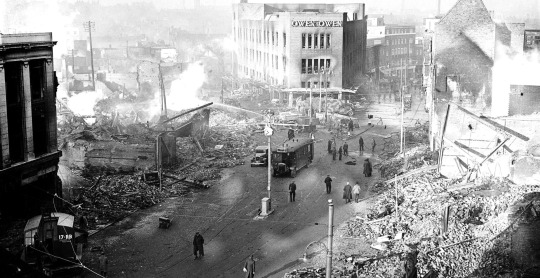

Rationing
In the first few chapters, Frankie makes several references to the state of food rationing in 1943. Throughout the Second World War, food supply in the UK was severely limited due to its reliance on imports, and the economic state was so dire following the war that Britain continued rationing until 1954. Huge campaigns were introduced encouraging people to grow and supply their own food, and many commodities became unavailable due to shortages in certain ingredients. One such example was the production of Cadbury's chocolate, which had to be altered to 'Ration chocolate' due to milk shortages.

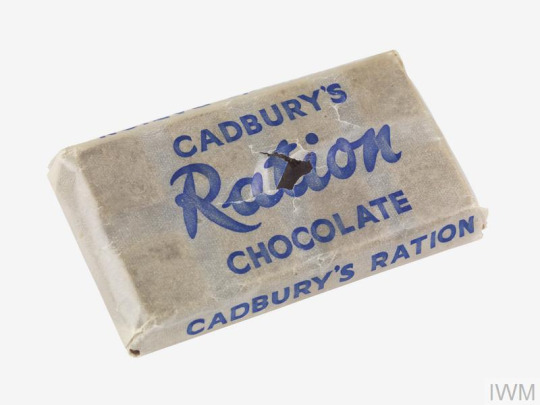
The Young Visiters by Daisy Ashford
In Chapter 7, Frankie is seen reading The Young Visiters, a hugely popular book published in 1919. The book's charm and popularity came from its author, as Daisy Ashford was allegedly only nine years old at the time of publication, and her unconventional writing and youthful misunderstanding of Victorian high society lend to the book's rather bizarre sense of humour.
Education
In Chapter 6, Rosie learns to his surprise that Frankie has not attended school since she was 14 years old. Under the 1918 Education Act, the school leaving age was raised from 12 to 14 years old, with high drop-out rates due to the inaccessibility of many schools to the working class.
━━━━━━━━━━━━━━
Better Off
The ATS
The Auxiliary Territorial Service was active from 1938, and operated as the women's branch of the British Army until it was absorbed into the Women's Royal Army Corps in 1949. The National Service Act of 1941 called for all unmarried women between the ages of 20 and 30 to join one of Britain's auxiliary services, and by 1943 nine of out every ten women were taking an active role in the war effort. Due to manpower shortages, many ATS women took on roles in radar and anti-aircraft defense, resulting over 700 casualties throughout the war. Most notable of the ATS volunteers was Princess Elizabeth Windsor (later Elizabeth II), who worked as a mechanic as well as driving lorries and ambulances.
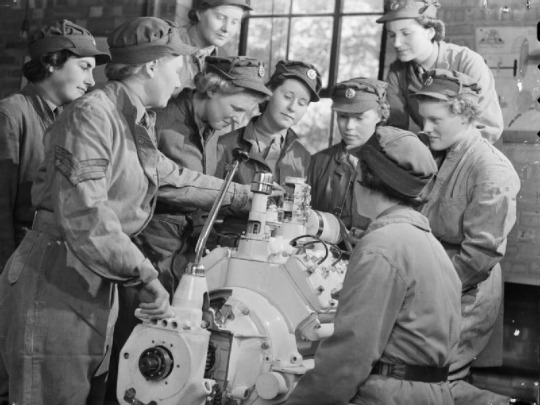
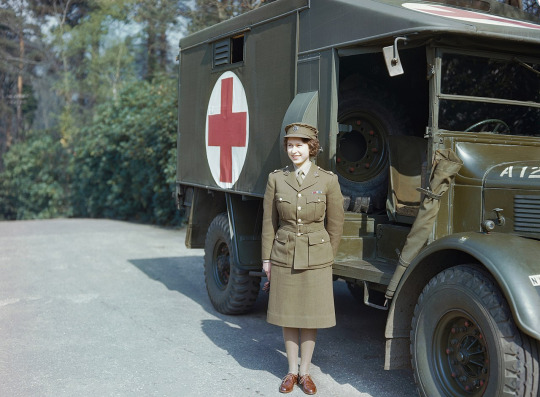
The Manchester Blitz
The attack which killed Susie's sister Ellie was a part of a series of bombing raids known as the Manchester Blitz, which took place between 1940 and 1942. Manchester and its surrounding towns were key for war production, and as such targeted heavily by the Luftwaffe, resulting in approximately 1,000 deaths. The nights of the 22nd and 23rd of December 1940 were the most devastating attacks on Manchester during the war, with more than 450 tons of explosives dropped across the two consecutive nights.

Back-to-back houses
The home that Susie's family were raised in was part of a large wave of construction in the UK of so-called 'back-to-backs', designed to support the huge influx of working-class families moving into urban areas during the Industrial Revolution. Back-to-backs were built quickly and cheaply, and named due to their shared back walls, which saw one row of houses facing the street and another rear row facing either another road or an interior courtyard. These houses were often very cramped, with only one room per floor, and usually had two to three stories, occasionally with a cellar too.
It was rare for back-to-backs to accommodate indoor plumbing, with washhouses and toilets located outside in the yards. Due to poor living conditions, the construction of new back-to-backs was forbidden in 1909 after a report discovered mortality rates to be significantly higher than those of people living in other styles of housing. Waves of slum clearance before and after the Second World War saw the numbers of back-to-backs decline rapidly, and Leeds remains the only area of England that still contains large numbers of livable back-to-backs. The only surviving courtyard back-to-backs now exist in Birmingham, preserved as a museum.


38 notes
·
View notes
Note
Sephiroth is literally a child on his first mission, under direct orders from the most powerful company in the world and has been raised since birth to be a weapon used against anyone that opposed Shinra…the fact that he is not completely brainwashed and can actually see some of the fucked up aspects of the situation he is in just shows that he is more empathetic than anything else and does deserve sympathy.
People also keep missing or forgetting that him killing kids in that scene isn’t just an adult slaughtering children…he is fighting his own peers. He is a child. The devs called him a young boy, they called him pure and unsullied. They are showing us a child soldier bred for one purpose on his first mission.
How can he stop and say “I can’t kill other kids that are trying to kill me. It’s not fair to kill kids.”
The Rhadoran situation also is clearly at its bitter end. It’s awful to see, but a society doesn’t start throwing kids and old people onto the battlefield until after they are on their last legs and have been almost wiped out. Sephiroth is sent towards the end to simply finish what Shinra clearly started. Shinra is the enemy that decided to destroy a race of people for challenging them.
Shinra is the one that taught their poster child to suppress his emotions and not hesitate because it’s kill or be killed, and in a very disturbing way, they are right. They started a war and now their enemies are fighting with everything they have. They aren’t going to spare some little boy with a sword on Shinra’s side of the battlefield.
The whole situation is literally not Sephiroth’s fault. Maybe we could argue that he should have refused to engage in the mission, but this is Shinra’s born and raised Soldier we’re talking about.
Do we really think that, A) He would even have the choice? We have seen what happens to deserters. The company eliminates them, and for Sephiroth, he is so valuable that they would probably want to bring him back in for more conditioning. He is already hopeless about living a normal life as well. Just another hint.
B) Since he clearly also has been conditioned his entire life, he may not even see why Shinra is in the wrong. For all we know, he has been told the Rhadorans were always at fault and were a very dangerous enemy.
This child is broken and conditioned heavily. With how he was raised, he should have acted more like Azula from Avatar, but instead he is a sweetheart when not engaging with the enemy. Real Sephiroth wants to find his mother and live normally. He is delighted to have fun for the first time in his life and laugh. He is hurt by being told he is different or not strong enough. He finds comfort in companionship and breaks down when confronted with the truth of his own life as a soldier.
He goes back into business mode when on the battlefield but that is what he was brought up to do. And if he doesn’t deserve sympathy, then neither does Zack for fighting against Wutai. Neither do Genesis and Angeal. Even Cloud joining soldier to be like Sephiroth, the hero of the Wutai War, could be held accountable for not seeing why Shinra was in the wrong about the war.
They were all fed lies since their youths. Can we blame the disgusting corporation that set it all in motion instead?
Couldn't have said it better myself. This is a perfect summation!
#asks#ff7#ffvii#final fantasy 7#sephcanons#sephiroth#ffvii first soldier#ffvii ever crisis#Ever crisis#First soldier#Young Sephiroth
31 notes
·
View notes
Text
Bengiyo's Queer Media Syllabus
For those who are not aware, I have decided to run the gauntlet of @bengiyo’s Queer Cinema Syllabus and have officially started Unit 1: Coming of Age Post Moonlight. The films in Unit 1 are Pariah (2011), Get Real (1998), Edge of Seventeen (1998), My Own Private Idaho (1991), and Mysterious Skin (2004)
Today I will be writing about
My Own Private Idaho (1991) dir. Gus Van Sant
[Available for rent on: Amazon, YouTube. Run Time- 1:44]
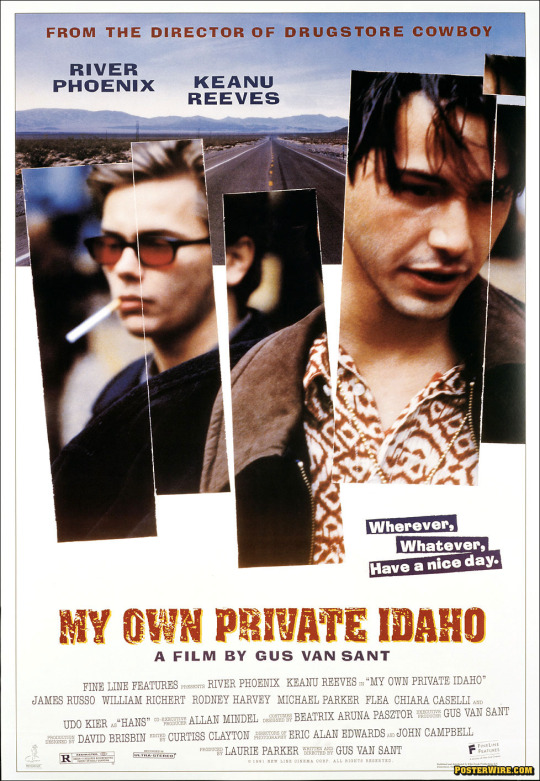
Summary: In this loose adaptation of Shakespeare's "Henry IV," Mike Waters is a gay hustler afflicted with narcolepsy. Scott Favor is the rebellious son of a mayor. Together, the two travel from Portland, Oregon to Idaho and finally to the coast of Italy in a quest to find Mike's estranged mother. Along the way they turn tricks for money and drugs, eventually attracting the attention of a wealthy benefactor and sexual deviant. (from Just Watch)
Cast: River Phoenix as Mike a homeless queer male sex worker with narcolepsy Keanu Reeves as Scott the mayor’s son, “homeless” sex worker who is friends with Mike William Richert as Bob, I don’t have any other way to describe him besides this character is Falstaff in Henry IV.
Content Warning: mentions of sexual assault, prostitution, conversations around incest. homelessness.
So the first thing before we start, if you are planning on watching this film you have to remember this is based on Henry IV by Shakespeare. Because if you forget that (like I did until about 40 minutes in) there is going to be dialogue that makes you go “no one talks like this?????” (which honestly was not a bad thing, but remembering that it was Shakespeare did stop me from going down way too deep a rabbit hole about reality and unreality so…thank you brain! Now, unfortunately, I have not read Henry IV and also unfortunately I will not read Henry IV for the sake of being better able to analyze this film.
In hindsight, Scott is a dick and the film so perfectly sets up/foreshadows how we are going to get to where we end up with Scott, but as it is happening, it feels like a massive, unexpected punch in the gut the second you see him back from Italy, in a nice suit, in a nice car, driving blindly past his old pal Mike, who is collapsed in a sleep attack on the sidewalk.
I always love when media humanizes homeless, drug user, and sex worker communities so for me watching this film, that was a huge win. Unhoused folk, drug users, and sex workers are so fucking dehumanized in my society, and frequently blamed for their own life conditions, and considering the statistics on how many homeless people in the US are queer, and particularly how many queer youth are on the streets, it is particularly important to me that film, queer film especially, allows its audience to love, root for, and mourn for homeless queer people.
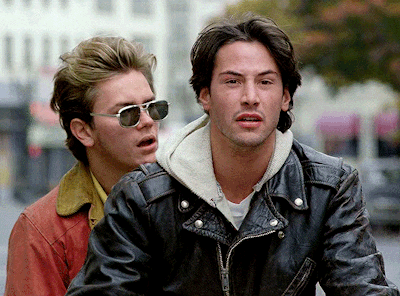
Gif by @camyfilms
I like that you don't really know exactly how Mike got to where he is. But there is enough context with the flashbacks we get and his medical condition to understand any number of ways that Mike ends up unhoused. I think it is particularly notable that there are multiple moments in the film where a house or other form of stable shelter is destroyed in his mind. Where I appreciate not really know exactly how Mike became homeless, because in a way it feels like his entire life was set up so that was the only inevitable outcome. Scott, however, I have no idea how he got to where he is, homeless and doing sex work, when he is set to inherit his father’s fortune soon.
And looking back at how the entire story plays out, knowing that Scott will eventually abandon Mike to pursue a love interest and wealth, it makes a lot more sense as to why we never truly find out how he got there. Because for Scott, it doesn’t fucking matter. Because for Scott, he is playing at being homeless. This is a funny little game for him, he can give a middle finger to his father and act out, and struggle for as long as it is entertaining and fun, knowing that at any point he can return home, shape up his behavior, and have more money then he knows what to do with.
Which is why I am truly and deeply obsessed with the fact that Scott wears a suit when he is amongst the other unhoused folk he is living with. Because of how much that visually separates him. I like that it is serving as a reminder of his status and almost like a reminder to himself that he is actually separate from everyone else here. And this theme is repeated in how Scott interacts with his father too. Because, while he wears a suit when amongst the unhoused, when he is summoned before his father, he dresses with a collar, and denim jacket without a shirt on underneath. Visually he looks a lot more like the other members of the community he has been running with, and that literally only happens so that he can get a rise out of his father.


gifs by @vintageblr
And that playing at oppression aspect of Scott’s character is marked so clear by the line he says near the end: "I think I need to take a break for awhile" or whatever the exact wording is, when he meets a girl in Italy and sends Mike home. Scott has money, and while a part of me still believes that Scott cares about Mike, he doesn't love Mike. So the second that Scott has something that he loves, something that he wants, he pumps the brakes on the struggle bus and puts an end to his life of sleeping rough and engaging in sex work.
And like I said before, while I felt hurt and betrayed and pissed the fuck off when Scott drove by Mike on the street, looking back at the entire film, the signs have been clear from the beginning. Because Scott is never going to be able to give Mike what he wants, at any level, in any capacity. Scott promises that he will share the wealth with the community when he inherits the money, he has the means, motive, and opportunity to perform such an action. He has the ability by the end to give Mike the support that he needs. To help him get on his feet, but he never does it.
Even just by way of Mike being in love with Scott and Scott being straight and not being able to give Mike what he wants.
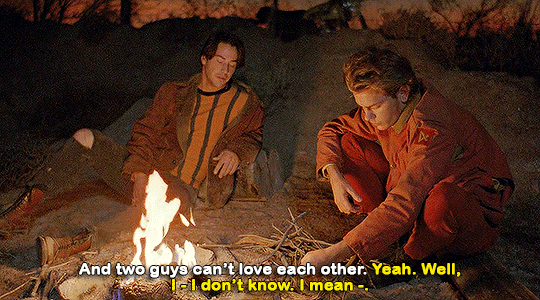
I will be thinking for way too long about the way that Scott stares at the ruckus everyone is making at Bob's funeral. Because, I don't know, I feel like there is almost a part of him that is longing to be there. That is missing it a little bit, or maybe feeling a little guilty. At least, that is how I am reading it as someone that worked with and considered myself friends with unhoused people. When I stopped working that job, I lost all connection with them, and the last time I got to see any of my friends again…was at a funeral.
When discussing my thoughts on this film with @bengiyo and @emotionallychargedtowel I was really cycling back and forth between where I landed in believing that Scott cared at all for the people he lived among for years.
Like there are shitty people who are homeless, sure, but there are also so many really wonderful people who are homeless, and there is no way that Scott, even as a rich bitch that was playing at poverty, did not forge genuine connections with people. At one point, he was sitting in a diner, comforting a woman who was upset. Do you know how many times I've seen that?
And when I started saying that I did believe that Scott cared in part for Mike, I was slammed with a visceral memory of Scott leaving Mike out in the cold, to sleep on some random guy’s lawn while he went back in to town.
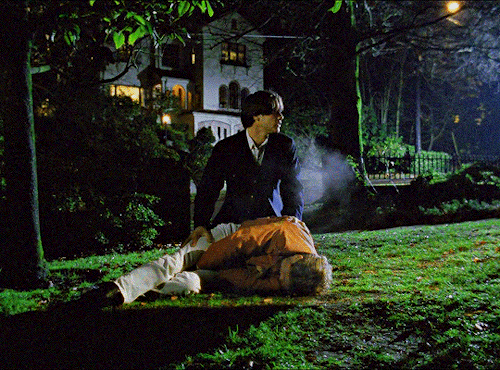
gif by @thejingshi
That said, he gave a reasoning of Mike being safer sleeping in that wealthy neighborhood with no one else around, then he would have been back in town. And similarly too, Scott holds on to Mike's half of the motorbike sales fund until it is time to send him away and also...he doesn’t give Mike all the money cause EVEN THOUGH SCOTT DOESN'T NEED IT!
I don't think he fully could have not cared. If he fully didn't care, I don't think the moments of tenderness would exist.
I don't think Scott would have gone to fucking Idaho
I don't think he would have been staring off the way that he was at the funeral
But you can't even get into the thought of like, Scott has strict rules to follow now that he has the inheritance money. But like…
No he doesn't.
His Dad is dead, and he has the money, what is anyone gonna do if he doesn't act like a refined gentleman? Nothing.
God I want to punch this man.
At the very least Scott and Mike were friends.

gif by @peeta

gif by @thejingshi
And so whether or not Scott gave a flying fuck about anyone else in that community, there is someone that he cared about, that he left to rot because it was more convenient for him. And I’d like to think Scott has to face that a bit during the funeral scene. Cause based on the way that it was shot, it looks like Mike is staring straight at Scott, but when we get the shot from Scott's POV, you can only see like the barest tops of heads and chairs flying so I don't even know that Scott and Mike
And the ending of the movie? God, heartbreaking. This whole film just made me see so many echoes of people I care about, having shit luck their entire lives, ending up on the streets, getting in to sex work of some kind, casually referencing their latest rape by a client, maybe having things be good for awhile (getting housing, getting reconnected with someone they care about, getting accepted in to school) and then just having that ripped away from them. Getting their shit stolen.
And on the other side of it too like, being connected, talking with one another, taking care of each other. All the times that someone has been having a particularly bad day, and before I could even go over and talk to them and check in, someone else from the community swoops in comfort them, and make sure they were doing okay.
I loved this movie. I think everyone should watch it.
By/For/About?
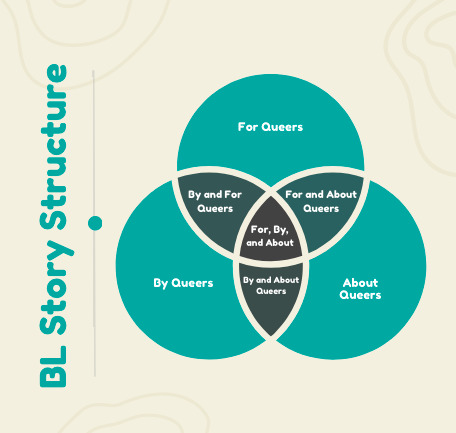
The Gay Trifecta!
We know that this is an About Queers film, because Mike is queer.
By Queers: I'm not 100% certain if the director is gay, it didn't say it explicitly anywhere, but he is behind a number of keystone queer films, and I think I saw an interview about gay activism that involved him.
For Queers: This is a story about the struggles of being a queer man, among other things. But I think the center of, loving a man you know can never love you back, and being fucked over by that in the end reads very much as for a queer audience.
Favorite Moment:

Everyone going buck fucking wild at Bob's funeral. It was such a moment of unrestrained energy, and I like it all the more for what it did to Scott.

Favorite Quote:

gif by @magnusedom
"I really want to kiss you, man."
If you know, you know. If you don't, watch the movie so you too can understand how devastating that line is.
9.5/10 Film
#my own private idaho#bengiyo queer cinema syllabus#river phoenix#keanu reeves#will never stop thinking about the way the filmed the clouds in this movie
58 notes
·
View notes
Text
superheroes well known for being easily lead or inspired by a singular person
its not like they're famous for popping up largely independently and doing their own thing for years before even running into another superhero even if there's multiple running around the same city
so the writer has made Superman's second coming the second coming of Christ and thus the kickstarter to the end of the world b/c… that says great things about superheroes in yer superhero book
again very heavy Christian themes that i dont care for and don't mean anything good for this lackluster story
are we gonna pretend that there arent superheroes like Praxis running around in teh main DC universe at the time who was just as openly racist as this ultra patriotic 'superhero' here?
like, just, Superman and the like dont give a shit mostly about the dark edgy superheroes in teh mainstream DC universe except for stories not unlike this where the main thing is criticizing the fuckers.
oh no the bystanders! It not like I've read a story featuring SUperman being perfectly fine with demolishing peoples' homes on account of he can just rebuild shit later
i think this writer might be unaware of all the fuckers who died or got maimed or injured in normal superhero fights back in the day just cause the artists and writers never showed the collateral because superman was neccessary for all these heroes who started independently of him to get off their asses and protect more than just one small area
b/c we all know that SUperman is the bestest best boy in the universe and every hero needs him as inspiration to be heroic Fascinating how Red Robin is shown as one of the good heroes of yester year when he's rightfully contemporary of Lightning, Black Lightning's daughter shown as one of these reckless youthful metas with no morals
it's not escaped me that all of our great heroes of yesteryear are white. And a good chunk of our amoral young metas are notwhite, and also the majority of heroes that were aquired from other companies. Strange that~ Totally a coincidence and not something to look into
I just kinda hate this story. I dont think its good. It's giving 'the good old days'/Make DC Great Again vibes. The only reason I picked it up is to get more info on Ted in this universe b/c the wording on his beetle armor has me unclear if its actually armor made by Khaji Da or just powered by it
and of course fuckers pulling a Batman and acting like fuckers need to be sanctioned by them to be allowed to be superheroes b/c that's how superheroes work
Batman's mansion is run down. His identity got exposed a while ago. The Batcave is half flooded
actions to disparage the amoral youthful heroes for: Blowing up the torture prisons where supervillains get turned into slaves with bombs implanted in their heads and normal criminals get lobotomized
sure they should not have also killed the prisoners. But destroying the prisons? go for it
also love how stories of this type always play the superheroes as the problem. Due to wro
ng methods and shit when superheroes are largely just a symptom of the issues plaguing society as much as the crime they fight
less crime would mean less superheroing of all regards, less poverty and war and shit would mean less crime but also just saying that more metahumans is just going to lead to shit going to shit is just such a bad message for a superhero comic given how much of folks becoming metas is a stress response and/or saying that superheroes shouldn't breed b/c their superhuman offspring will fuck shit up
yeah Batman generally seems inclined to turn shit into a police state in his brand of superheroing like that's good
helpful or desirable and Bruce calling Clark out for his tendency to turn totalitarian when shit goes sour
like both of you are terrible in yer own ways
i feel like Green Arrow and Blue Beetle should not get along as well as they keep being shown too in shit like this just cause they're teh same type of superhero. Especially Mr. Problems with authority Blue Beetle
why are yall relying on Batman's plans yall are just as smart if not smarter and way better with people
I hate this story so much. Both Superman AND Batman were the bestest of the best the pinnacle of superheroing. Makes me want fucking vomit
also I love how often Wonder Woman is just fucking chopped liver in the stories like this that ride Batman and Superman's dicks they're getting paid for it Dr. Mid-Nite can fly??
like for some reason Diana isn't allowed to be the pinnacle of paragon or truth or justice and has to try convincing Superman to lead them all into a better future and how she just dips into bloodlust when things go poorly like…
Also none of the younger new heroes are allowed to be viewpoint characters yet b/c this is a propaganda piece an we cant humanize the fuckers we wish to disparage
we get supervillains, the old guard supervillains of course, as viewpoints b4 we get any of the youth that's being disparaged
It's also 90% white in this old guard important villain's meeting.
so a good chunk of these amoral young metas are villains
a group of mostly white elderly villains actively making shit worse, to provoke a war between regular people and super people b/c sure people will somehow benefit
8 notes
·
View notes
Text
My friends, we're taking November off to catch up/relax, and then for December, we'll be reading a cozy classic! The top three on this poll will then go on to be voted on in our Discord. If you'd like to joy in, feel free to send me a message! The book summaries are underneath the cut!
Pride and Prejudice by Jane Austen
A novel of manners about the romantic pas de deux between Elizabeth Bennet and Fitzwilliam Darcy, two perfectly suited lovers who, at first, find each other insufferable. Despite Elizabeth’s disdain for Darcy, fate seems determined to keep throwing this pair together: and Darcy, almost in spite of himself, will make revelations that will end up causing Elizabeth to question everything she believes. Set in a time when marrying well was a woman’s only way to assure a secure and comfortable future, Pride and Prejudice is arguably the forerunner of all romantic comedies and certainly one of the best-loved novels of all time.
Rebecca by Daphne du Maurier
Last night I dreamt I went to Manderley again…
The novel begins in Monte Carlo, where our heroine is swept off her feet by the dashing widower Maxim de Winter and his sudden proposal of marriage. Orphaned and working as a lady’s maid, she can barely believe her luck. It is only when they arrive at his massive country estate that she realizes how large the shadow his late wife will cast over their lives—presenting her with a lingering evil that threatens to destroy their marriage from beyond the grave.
The Strange Case of Dr Jekyll and Mr Hyde and Other Tales by Robert Louis Stevenson
Stevenson’s short novel, published in 1886, became an instant classic. It was a Gothic horror that originated in a feverish nightmare, whose hallucinatory setting in the murky back streets of London gripped a nation mesmerized by crime and violence. The respectable doctor’s mysterious relationship with his disreputable associate is finally reveals in one of the most original and thrilling endings in English literature.
In addition to Jekyll and Hyde, this edition also includes a number of short stories and essays written by Stevenson in the 1880s, minor masterpieces of fiction and comment: ‘The Body Snatcher,’ ‘Markheim,’ and ‘Olalla’ feature grave-robbing, a sinister double, and degeneracy, while ‘A Chapter on Dreams’ and ‘A Gossip on Romance’ discuss artistic creation and the 'romance’ form.
Maurice by E.M. Forster
Maurice is heartbroken over unrequited love, which opened his heart and mind to his own sexual identity. In order to be true to himself, he goes against the grain of society’s often unspoken rules of class, wealth, and politics.
Forster understood that his homage to same-sex love, if published when he completed it in 1914, would probably end his career. Thus, Maurice languished in a drawer for fifty-seven years, the author requesting it to be published only after his death (along with his stories about homosexuality later collected in The Life to Come).
The Picture of Dorian Gray by Oscar Wilde
In this celebrated work, Wilde forged a devastating portrait on the effects of evil and debauchery on a young aesthete in late-19th-century England. Combining elements of the Gothic horro novel and decadent French fiction, the book centers on a striking premise: As Dorian Gray sinks into a life of crime and gross sensuality, his body retains perfect youth and vigor while his recently painted portrait grows day by day into a hideous record of evil, which he must keep hidden from the world. For over a century, this mesmerizing tale of horror and suspense has enjoyed wide popularity. It ranks as one of Wilde’s most important creations and among the classic achievements of it its kind.
The Secret History by Donna Tartt
Under the influence of their charismatic classics professor, a group of clever, eccentric misfits at an elite New England college discover a way of thinking and living that is a world away from the humdrum existence of their contemporaries. But when they go beyond the boundaries of normal morality, they slip gradually from obsession to corruption and betrayal, and at last—inexorably—into evil.
The Three Musketeers by Alexandre Dumas
This swashbuckling epic of chivalry, honor, and derring-do, set in France during the 1620’s, is richly populated with romantic heroes, unattainable heroines, kings, queens, cavaliers, and criminals in a whirl of adventure, conspiracy, murder, vengeance, love, scandal, and suspense. Dumas transforms minor historical figures into larger-than-life characters: the Comte d’Artagnan, an impetuous young man in pursuit of glory; the beguilingly evil seductress “Milady”; the powerful and devious Cardinal Richelieu; the weak King Louis XIII and his unhappy queen—and, of course, the three musketeers themselves, Athos, Porthos, and Aramis, whose motto “all for one, one for all” has come to epitomize devoted friendship. With a plot that delivers stolen diamonds, masked balls, purloined letters, and, of course, great bouts of swordplay, The Three Musketeers is eternally entertaining.
6 notes
·
View notes
Text
Some thoughts on feminism from a trans perspective
What has feminism done for trans people? This is, surprisingly, a question that isn’t often asked. But the answer is quite revealing: nothing, unless one wants to include negatives, in which case, a lot of bad things.
There’s an expectation for trans women that you’re supposed to be a feminist. So much as questioning feminism, or even expressing indifference to it, is frequently met by vitriol and hostility, typically expressed through misgendering, whether covert or overt. I’ve even had trans women say I deserve transphobia for not being a feminist. ‘Vitriol and hostility’ are really understatements of how tense other trans women can get when you don’t have the right opinion on this subject. The only possible outlet for criticism of feminism is criticism of TERFs, and transfeminists are extremely eager to point out that the TERFs are supposedly a minority, and hell, they’re probably not even real feminists anyway!
But again, my mind just returns to that question. What has feminism done for trans people? If you actually pose that to a transfeminist, they begin to stumble. They’ll stop talking to you, or they’ll deflect, or they’ll ignore the question and focus on something else you’ve said, or they’ll claim that somehow feminism laid the foundations for trans rights and that we don’t owe trans rights to the trans men and trans women who fought for them, or even to the researchers and surgeons who developed lifesaving transition-related care, but instead to activists who were fighting for unrelated concerns and who, by and large, were and are hostile to us.
What they’ll never do is actually name something substantive. I’m not saying individual feminists have never done anything substantive for trans people, but I can’t think of a single thing, and seemingly even transfeminists can’t either, otherwise they’d tell me. I can think of a large number of bad things feminists have and continue to do in regards to trans rights. Janice Raymond contributing to the removal of trans healthcare coverage under the Ronald Reagan administration of the United States, resulting almost certainly in the deaths of trans people, for example. Or the fact that gender recognition reform in the UK has been utterly derailed by feminists, or the fact that feminists have effectively destroyed youth transition resources in the UK. Or how about the time Sheila Jeffreys called trans people parasites to the Houses of Parliament? Feminists have been calling for the elimination of trans people since at least the second wave, constructing glossy looking pieces of academic tripe from The Transsexual Empire in 1979 to the Declaration on Women’s Sex-Based Rights in 2019. In my own homecountry, the people spearheading the anti-trans movement aren’t a bunch of far-right Handmaid’s Tale larpers, dreaming of a Gilead knock-off they hope to institute one day–they’re feminists.
Of course, I’m ready to hear the cry of ‘those are TERFs!’ or ‘those aren’t real feminists!’, well, where precisely are the real feminists? Again, what have feminists done that is good for trans people? Can you blame me for being antifeminist, when all the feminists I see having any influence on my life and the lives of my people, both now and in the past, are ones who want to eliminate us? At the very best, most feminists are utterly indifferent to trans issues, in which case, why should I support a movement indifferent to my suffering? At worst, most of them harbour transphobic viewpoints–not, perhaps, as toxic as your average TERF’s, but transphobic nonetheless, and such a conclusion is the one I lean to, considering how prevalent transphobic attitudes are in all areas of society, and my own anecdotal experiences.
What is interesting though, is that even if the correct choice is to support feminism despite its sordid history, the response to antifeminist or even just feminist-sceptical trans women is still insane. You think a movement which has been tarnished so badly by transphobia would be a little bit more understanding to those trans women who are reticent to interact with it, but instead all they receive is shaming, misgendering, and outright hostility. There aren’t even attempts to create dialogue around this issue, unless you first kiss the feminist ring and swear undying allegiance, in which case any dialogue you do attempt to make will be neutered from the start, set out entirely according to the terms of cis feminists.
A retort might be that feminism means equal opportunity for women, or ending oppressive structures against women, or gender equality, or whatever else, and so the only reason you could be opposed to it is due to being a misogynist who hates women. This is a specious argument. Movements are defined by their members’ actions, goals, and political stances–not by a pithy, idealised definition which floats in a vacuum. Unless you transfeminists think that the only reason one might be opposed to MRAs is simply because one thinks men should have no rights?
In sum, I see no reason to support a movement that hates me and wants me gone, nor do I see any reason for my sisters to support it either. Antifeminism is the only path to true liberation for trans people, and I dream of the day most trans women shed this unhelpful ideology.
#trans#trans woman#transfeminism#feminism#trans rights#transgender#transgender rights#anti feminism#trans theory
15 notes
·
View notes
Text
Unit 04: Nature Interpretation through Art
Methods of interpretation vary for everyone depending on various factors such as background knowledge, values, and interests. Interpretation through art depends on what one’s personal definition of art may be, and some may find it difficult to approach nature with art in mind. In my opinion, to interpret through art is to mold your perception through emotional and intellectual value, while also allowing it to be changed and influenced by the imagination of yourself and others. This specific change is important in the realm of art, since it is a type of interpretation in its own right. For example, if a group is given a landscape to paint, each painting will turn out different; be it different artistic style, different scenes, different colours, etc.
Relating art to natural heritage and global citizenship requires historical/cultural context, as well as an openness for inspiration and education to be added to already-established perspectives. In one of my other classes, we have placed great emphasis on interpreting environmental sustainability from varying perspectives, one being those of indigenous peoples. The artistic perspectives we have delved into take all kinds of forms, varying from art, to music, to poetry. Bruce King’s Moment in Flight is an example of nature interpretation that not only paints a beautiful portrait, but also emphasizes the cultural perspective of how plants and animals came to Earth from a different point of view. These instances are important to consider as they not only broaden our horizons but also uplift an inclusive approach.
Interpreting the gift of beauty is entirely subjective and does not require extensive artistic knowledge to perform. As mentioned in our reading, when interpretating nature it is important to consider heritage, cultures, and communities among the natural environments we find ourselves upon. The gift of beauty is one thing that can be translated across any language and culture, especially in nature. Considering this, we can promote the discussion of important topics regarding climate change. To see a beautiful scene in nature decline over time sends a message stronger than any statistic we read; we are witnessing the beauty of nature diminish right before our eyes!
Hahn’s concept of Social Declines of Modern Youth made me think about how we are affected by how the world around us changes. Specifically, his concept of declining memory, imagination and compassion. This can be related to the interpretation of natural beauty in our society by diminishing the respect we have for natural resources and their intrinsic value for not only practical use, but also personal enjoyment. Without memory, we cannot consider the drastic changes the world around us has experienced and fail to see through the bustle of our daily lives. Without imagination, we cannot interpret the artistic value of scenes we come across in nature. Finally, lack of compassion destroys the value of land’s history, as well as concern for the future of said land.
5 notes
·
View notes
Text
Sick of it all. Sickness. Collection of notes.
Sickness is a language
Body is a representation
Medicine is a political practice
— Bryan S. Turner, The body and the society
"What I lack is words that correspond to each minute of my state of mind."
— Antonin Artaud, The nerve meter
"Desmesurado enfermo Bárbaro limpio de rutinas y caminos marcados No acepto vuestras sillas de seguridades cómodas Soy el ángel salvaje que cayó una mañana En vuestras plantaciones de preceptos Poeta Anti poeta"
—Vicente Huidobro, Altazor.
"I saw the best minds of my generation destroyed by madness, starving hysterical naked" —Allen Ginsberg, Howl.
"First, we believe that the world must be changed. We desire the most liberatory possible change of the society and the life in which we find ourselves confined. We know that such change is possible by means of pertinent actions". —Report on the Construction of Situations
"In his 1954 book Mental Illness and Personality Foucault combines the subjective experience of the mentally ill person with a sociocultural historical approach to mental illness and suggests that there exists a reciprocal connection between individual perception and sociocultural development. (…) what I call a historical phenomenology that combines the subjective experience of the mentally ill person with a sociocultural historical approach to mental ill-ness." —Line Joranger, Individual perception and cultural development: Foucault's 1954 approach to mental illness and its history
"The former, a lovely maiden in the broad daylight, rocked its cradle, endowed it with a charm and glory of its own. Presently it fell sick, lost itself in the darkness of the Middle Ages, and was hidden away by the Witch in woods and wilds: there, sustained by her compassionate daring, it was made to live anew. (…) Are we quite sure of what has been so often repeated, that the gods of old had come to an end, themselves wearied and sickened of living; that they were so disheartened as almost to send in their resignation; that Christianity had only to blow upon these empty shades? (...) By a vow my mother made in her sickness my youth and my life are bound for ever." —Jules Michelet, La Sorcière.
"At the point of departure, then, one may place the political project of rooting out illegalities, generalizing the punitive function and delimiting, in order to control it, the power to punish. From this there emerge two lines of obiectification of crime and of the criminal. On the one hand, the criminal designated as the enemy of all, whom it is in the interest of all to track down, falls outside the pact, disqualifies himself as a citizen and emerges, bearing within him as it were, a wild fragment of nature; he appears as a villain, a monster, a madman, perhaps, a sick and, before long, 'abnormal' individual. It is as such that, one day, he will belong to a scientific objectification and to the 'treatment' that is correlative to it." —Michel Focault, Discipline and Punish
Nastasya was overcome with a fit of laughter. She was given to laughter and when anything amused her, she laughed inaudibly, quivering and shaking all over till she felt ill. "And have you made much money by your thinking?" she managed to articulate at last. "One can't go out to give lessons without boots. And I'm sick of it." "Don't quarrel with your bread and butter." "They pay so little for lessons. What's the use of a few coppers?" he answered, reluctantly, as though replying to his own thought. —Fyodor Dostoevsky, Crime and Punishment.
"What I’d felt there was true, no doubt about that. The experience had revealed to me, in a brutal way, the unreality of this world, the realized abstraction which is the Spectacle. The whole metaphysical – and thus total and filled out all the way to the existential sphere– dimension of this concept had appeared clearly to me in this private mode of disclosure, and could appear as it really is, as something really strange, posing a problem the essence of which is absolute foreignness, only insofar as it is lived as an experience, as a phenomenon. Habit makes phenomena be forgotten as phenomena, that is, the supra-sensible – must I add that Hegel’s famous affirmation too took on a kind of dazzling conreteness, the power of a revelation? And yet, habit is precisely the characteristic means of commodity metaphysics, its manifestation, which never manifests anything but the forgetting of its character as a manifestation… That’s how the bulging intuition of Absence also reveals that it’s already transcended as such, since it presents itself as a manifestation of the forgetting of the manifestation as such, meaning as the revealing of the commodity mode of disclosure, as the revealing of the Spectacle." —Tiqqun, Phenomenology of Everyday Life
"17.- Sense is the element of the Common, that is, every event, as an irruption of sense, institutes a common. The body that says "I," in truth says «we." A gesture or statement endowed with sense carves a determined community out of a mass of bodies, a community that must itself be taken on in order to take on this gesture or statement.
50.- Empire exists "positively" only in crisis, only as negation and reaction. If we too belong to Empire, it is only because i is impossible to get outside it .
52.-At first glance, Empire seems to be a parodic recollection of the entire, frozen history of a "civilization." And this impression has a certain intuitive correctness. Empire is in fact civilization's last stop before it reaches the end of its line, the final agony in which it sees its life pass before its eyes." —Tiqqun, Introduction to Civil War
"For Americans are finding more and more that they lack muscle and children, that is, not workers but soldiers, and they want at all costs and by every possible means to make and manufacture soldiers with a view to all the planetary wars which might later take place, and which would be intended to demonstrate by the over-whelming virtues of force the superiority of American products, and the fruits of American sweat in all fields of activity and of the superiority of the possible dynamism of force. Because one must produce, one must by all possible means of activity replace nature wherever it can be replaced, one must find a major field of action for human inertia, the worker must have something to keep him busy, new fields of activity must be created, in which we shall see at last the reign of all the fake manufactured products, of all the vile synthetic substitutes in which beatiful real nature has no part." —Antonin Artaud, To Have Done With the Judgement of god
"A study published in the May 2021 issue of the British Journal of Health Psychology looked at health-related guilt in relation to having chronic pain. (…) The research turned up three major themes that had been reported on in the previous research. These included the following.
-Management of chronic pain -Diagnostic uncertainty or legitimizing pain -How the person impacted others by their action or inaction. -The health-related guilt that many people with chronic pain experience is from coping with the condition and the decrease in quality of life that it often brings about. (…) Those who have chronic pain may feel guilty because they are unable to do things they want to do. They may feel that they are letting others down, or they believe they are doing something wrong or intentional. The guilt can lead to more issues, such as depression, making it something that should be addressed." —Steven H. Richeimer, The Impact of Health-Related Guilt and Chronic Pain
"No soy Pasolini pidiendo explicaciones No soy Ginsberg expulsado de Cuba No soy un marica disfrazado de poeta No necesito disfraz Aquí está mi cara Hablo por mi diferencia Defiendo lo que soy y no soy tan raro Me apesta la injusticia y sospecho de esta cueca democrática Pero no me hable del proletariado Porque ser pobre y maricón es peor Hay que ser ácido para soportarlo (…) ¿Van a dejarnos bordar de pájaros las banderas de la patria libre? El fusil se lo dejo a usted que tiene la sangre fría y no es miedo El miedo se me fue pasando De atajar cuchillos (…) Aunque después me odie Por corromper su moral revolucionaria ¿Tiene miedo que se homosexualice la vida? Y no hablo de meterlo y sacarlo Y sacarlo y meterlo solamente Hablo de ternura compañero." —Pedro Lemebel, Hablo por mi diferencia
"In late 2014, I was sick with a chronic condition that, about every 12 to 18 months, gets bad enough to render me, for about five months each time, unable to walk, drive, do my job, sometimes speak or understand language, take a bath without assistance, and leave the bed. This particular flare coincided with the Black Lives Matter protests, which I would have attended unremittingly, had I been able to. I live one block away from MacArthur Park in Los Angeles, a predominantly Latino neighborhood and one colloquially understood to be the place where many immigrants begin their American lives. The park, then, is not surprisingly one of the most active places of protest in the city.
I listened to the sounds of the marches as they drifted up to my window. Attached to the bed, I rose up my sick woman fist, in solidarity.
I started to think about what modes of protest are afforded to sick people – it seemed to me that many for whom Black Lives Matter is especially in service, might not be able to be present for the marches because they were imprisoned by a job, the threat of being fired from their job if they marched, or literal incarceration, and of course the threat of violence and police brutality – but also because of illness or disability, or because they were caring for someone with an illness or disability.
I thought of all the other invisible bodies, with their fists up, tucked away and out of sight. If we take Hannah Arendt’s definition of the political – which is still one of the most dominant in mainstream discourse – as being any action that is performed in public, we must contend with the implications of what that excludes. If being present in public is what is required to be political, then whole swathes of the population can be deemed a-political – simply because they are not physically able to get their bodies into the street.
(…) The Sick Women are all of the dysfunctional, dangerous and in danger, badly behaved, crazy, incurable, traumatized, disordered, diseased, chronic, uninsurable, wretched, undesirable and altogether dysfunctional bodies belonging to women, people of color, poor, ill, neuroatypical, differently-abled, queer, trans, and genderfluid people, who have been historically pathologized, hospitalized, institutionalized, brutalized, rendered unmanageable, and therefore made culturally illegitimate and politically invisible." — Johanna Hedva, Sick Woman Theory
"I’m all for the death of capitalism, but what the hell was this? Sick, pained, expensive, sensitive: these were not words that inspired any revolutionary fervor in me. My anarchism had always been a thing of life, vitality, and beauty. When I think of it energetically, I feel strong rivers of red force, unbridled kinetic power moving reality. It’s a verb, something you do.
My heroes didn’t go to General Assemblies to talk, they robbed banks and shot fascists. They burned down houses or construction equipment instead of engaging in sit-in’s or camping sessions. My anarchism is unapolegetically violent, even gleefully so, and I long for the acrid smoke of a riot like junkies long for meth.
Here appeared to be the quiet, soothing politics of the ill. Anarchist therapy. I was happy to see those confined to a hospital bed could display solidarity in their own way, but I walked away firmly convinced I’d taken a stroll through a world that had no bearing on mine.
Some people’s revolution involved care and love and feelings. Mine involved bullets and fire and blood.
Yet…something lingered, some subtle shift deep within my mind. I began to realize that just because the response of the ill to capitalism might be different from mine, that did not mean the exploitation they lived under was any less brutal." — Dr. Bones, Too Weird to Live: The Case for the Individual in a Sick Woman’s World
"And, left to themselves, men lived long before they understood that they all ought to, and might be, happy. Only in the very latest times have a few of them begun to understand that work ought not to be a bugbear to some and like galley-slavery for others, but should be a common and happy occupation, uniting all men. They have begun to understand that with death constantly threatening each of us, the only reasonable business of every man is to spend the years, months, hours, and minutes, allotted him—in unity and love. They have begun to understand that sickness, far from dividing men, should, on the contrary, give opportunity for loving union with one another." — Leo Tolstoy, Work, Death and Sickness
#leftism#leftblr#anarchism#anarchist#postmodernism#postmodern#postmodern literature#politics#Antonin Artaud#Leo Tolstoy#Pedro Lemebel#tiqqun#Collection of notes#comunismo#communism#mental illness#chronic pain#chronic fatigue#antiwork#anti landlord#michel foucault#foucault#sickness#chronic illness#chronically ill#poetry#words words words
19 notes
·
View notes